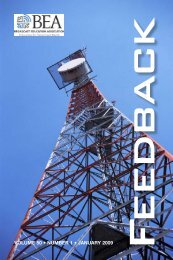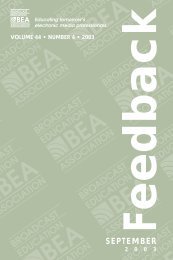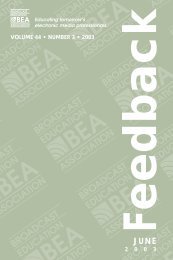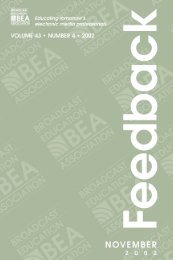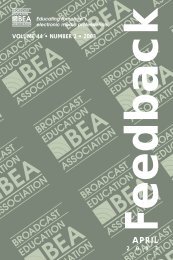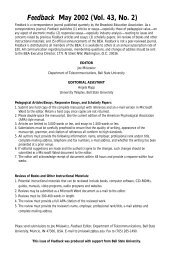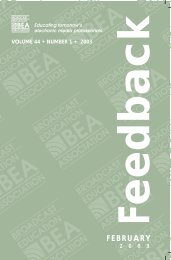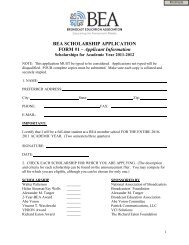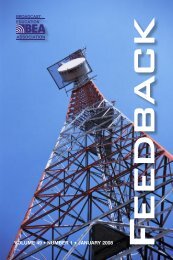Feedback
Feedback May 2005 - Broadcast Education Association
Feedback May 2005 - Broadcast Education Association
Create successful ePaper yourself
Turn your PDF publications into a flip-book with our unique Google optimized e-Paper software.
The site also allows users to rate professor “sexiness” (depicted as a hot chili pepper)as well as provide a limited space for comments (initially 70 characters, but recentlyexpanded to 255 characters.) A final category of “rater interest” (ostensibly in the courseprior to enrollment) was added in October 2004.Although RateMyProfessor wisely makes no claim of being statistically accurate inits ratings, it does promote itself as being a useful resource for students. Swapceinskiproudly proclaims on the site “Every semester, thousands of students use the site tohelp plan their class schedules and improve the quality of their educations.” While thissite might provide assistance to the students who place heavy reliance on it to chooseor avoid certain teachers (and, indeed, while not the majority, they are out there) it ismy feeling that it is in the best interest of instructors to adopt strategies to minimize itsimpact upon their own careers.WHY DOES THIS MATTER?Firmly believing in the affective, almost time-released, nature of education, I’m nota big fan of student evaluations of teaching. Don’t get me wrong - I do fine on them,having once received a perfect 4.0 score in every category (admittedly, it was a class oftwo people). However, as a student many of the classes I had the most vehement initialreaction to and enjoyed the least turned out to be the ones I realized months or yearslater that I learned from the most. Regardless, with the RateMyProfessor system, all thetimeframe speed bumps separating classroom exigencies from educational assessment areremoved. The test that covered more material than they expected, the poor grade on ahalf-hearted paper, the quiz a student wasn’t allowed to make up because he overslept,all become fodder for an instant, anonymous, and undisputable quid pro quo availableto anyone with Internet access.Furthermore, it is foolish to dismiss the impact of the site’s ratings as merely limitedto student consumption. Rather, these ratings impact the reputation of instructors atcollegial and administrative levels within their college or university, as well as affectingone’s reputation when seeking future employment options. Think about it - if you havebeen to this site, as I would wager the majority of people interested in this subject have,how long did it take you to start investigating the status of friends and colleagues?Indeed, I am aware of at least one instance in which information on this site has ledto administrational censure as in conducting research for this paper, I was told (confidentially,of course) by a graduate director that he had been made aware of graduateteaching assistant’s habitual lateness from commentary left on the site. While in thisanecdotal case the claims posted about the GA’s behavior ultimately proved to be accurateand a valid cause for intervention, the open nature of posting on RateMyProfessorleaves it open to create potentially damning “documentation” by anyone with Internetaccess and an axe to grind.Apart from the effect that such ratings have on instructor perception bystudents, colleagues, and people outside the college, a far more troubling aspect ofRateMyProfessor is the emotional toll that it can take on the person being evaluated. Alltoo often I have seen friends and colleagues enter a familiar three-stage pattern with thesite:• a flushed exhilaration upon discovering that they, too, have achieved a degree ofInternet immortality by being listed on the site (that more often than not is a “good8<strong>Feedback</strong> March 2005 (Vol. 46, No. 3)



